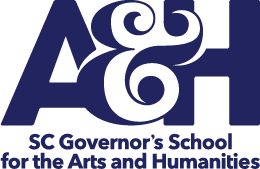S.C. Governor’s School for Arts recognized for arts ed research
Link uncovered between drama curriculum and reading success

The Arts Schools Network Board of Directors has awarded the Research Initiative-Institution Award to the South Carolina Governor’s School for the Arts and Humanities.
 The award honors an organization for its commitment to ongoing research and the dissemination of knowledge in research in arts education. The Governor’s School’s research initiative, implemented by the Office of Outreach in partnership with the South Carolina Arts Commission (SCAC) and University of South Carolina Department of Theatre and Dance, examines the potential impact that drama curriculum has on reading motivation and success for young children.
The award honors an organization for its commitment to ongoing research and the dissemination of knowledge in research in arts education. The Governor’s School’s research initiative, implemented by the Office of Outreach in partnership with the South Carolina Arts Commission (SCAC) and University of South Carolina Department of Theatre and Dance, examines the potential impact that drama curriculum has on reading motivation and success for young children.
Melissa Brookes, managing director for ASN, said, “Each year the Arts Schools Network board of directors take great pride in honoring and recognizing schools and individuals for their extraordinary efforts and impact throughout arts education. This year, we are thrilled to recognize the Governor’s School as the winner of our Research Initiative Award.”
In the Spark! outreach program that this research is based on, at-risk third-grade readers attending the state mandated Read-To-Succeed summer program are exposed to drama principles in addition to their reading requirements. Now in its third year, Spark! participants are showing increased gains in creativity measures like fluency and originality, along with critical reading measures required by MAP testing, when compared to similar students not exposed to the drama component.
“While we are only three years into this five-year initiative, the combination of creativity gains and reading gains together are what draws us further into this research, and we’re very excited to see these promising trends,” said Carol Baker, outreach director at the Governor’s School. “We’re grateful for this acknowledgement from the Arts Schools Network and for the ongoing support and participation of our partners, the South Carolina Arts Commission, who is funding this project, and the USC Department of Theatre and Dance, who is compiling and analyzing the data.”
About the Research
Dr. Peter Duffy, who heads the Master of Arts in Teaching program in theatre education at the University of South Carolina is leading this research which combines the qualitative measures of theatre making and creativity with quantitative methods of reading and motivation. “This research matters because it examines how story, motivation, and embodied learning through drama can impact a child’s desire to read, and how this component can affect the way young readers interact with their reading materials,” said Duffy. “We are studying how more creative teaching methods can motivate readers to really know the story inside and out.
“Our research suggests that students who engage in the drama work make small but important improvements in their overall reading scores. Gathering five years of data will help us see whether these trends hold overtime, giving us a stronger impression of the real impact these programs can make.”
The Spark! program was initiated at Kenneth Gardner Elementary in Williamsburg County School District, and thanks to two years of early positive findings, received increased funding to expand to Hardeeville Elementary in Jasper County School District. Both districts serve high poverty, rural, under-resourced populations and neither has a certified drama teacher at any level. Each school offers a multi-week summer remedial reading camp for rising fourth-grade students at risk of retention due to low test scores. The summer camp is part of the Read-to-Succeed program and is the last possible opportunity for these young students to increase their scores enough to move on to the next grade.
How this research impacts arts education funding priorities
“The Spark! outreach program’s research into the relationship between drama and reading in young, at-risk readers, provides compelling evidence of the correlation between creativity and reading retention,” said David Platts, executive director of the SCAC. “Working with Dr. Duffy and his team at the University of South Carolina and the SC Governor’s School for the Arts and Humanities has demonstrated how these types of programs, while specifically designed to help students, also provide vital information for agencies such as ours as we analyze and prioritize our programming decisions. Good decisions and responsible stewardship of public funds are possible only with the availability of solid and meaningful research and data.”
Getting students back on track
“Ultimately, this is about improving reading skills and reading motivation of young students in South Carolina,” said Dr. Cedric Adderley, Governor’s School president. “We know that early reading comprehension is the key to success, and in this day and time, when we’re seeing reading regression in elementary school students due to pandemic-imposed virtual learning, we hope that programs like Spark! will be part of the solution to getting these students back on track.”
“At the Governor’s School, we see first-hand how incorporating the arts into education can help improve student engagement, academic success, motivation, and hope for the future,” continued Adderley. “Now our challenge, as an arts resource and research center for teachers and students throughout the state, is to expand these proven programs to impact more students in need.”
About SC Governor’s School for the Arts and Humanities
Located in Greenville, the South Carolina Governor’s School for the Arts and Humanities cultivates young artists from across the state through pre-professional training in the areas of creative writing, dance, drama, music and visual arts. In the public, residential high school, students refine their talents in an arts-centered community while receiving a nationally recognized academic education. Summer programs are available to rising 7th-12th grade students. The Governor’s School serves as a resource to all teachers and students in South Carolina, offering comprehensive outreach programs designed to bring together artists, educators, community organizations and schools. SCGSAH.org
About the Arts Schools Network
Dedicated to excellence and leadership in arts education, Arts Schools Network, a non-profit association founded in 1981, provides arts school leaders, innovative partners and members of arts education institutions with quality resources, support and networking opportunities. Visit www.artsschoolsnetwork.org to learn more.
Image by Amberrose Nelson from Pixabay

